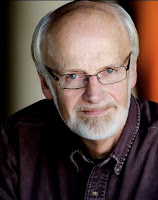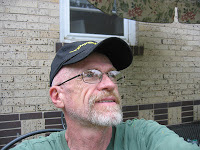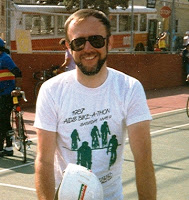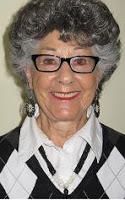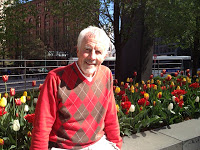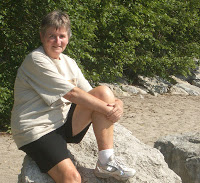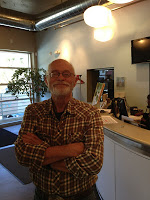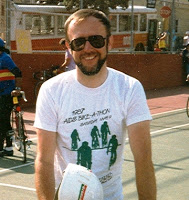I’m going to introduce you
to a villain. I thought of a bunch of good strange people I’ve known, but none
tells you much about me, and telling you about me is what I strive for in
storytelling. So I’m going to introduce
a villain—but first . . .
to a villain. I thought of a bunch of good strange people I’ve known, but none
tells you much about me, and telling you about me is what I strive for in
storytelling. So I’m going to introduce
a villain—but first . . .
I sat there, as we all did,
probably, trying to think of the strangest person I ever met. Imagining we’ve all lived good, full, rich
lives, and been open to all sorts of experiences, we each can think of, as I
could, dozens and dozens of strange characters we’ve crossed paths with. Sometimes they were brief encounters, like
the man I met on a broken-down Trailways bus in the Poconos when I was a teen,
the man who was dressed in full 19th century British military garb, the man who
turned to me and said his experience of being on a broken-down bus reminded him
of the Crimean War. Sometimes our brushes with strange people are more prolonged,
like the homeless man—and Donald may remember this man—who, when Donald and I
were in visual merchandising at the Denver Dry, would stare fixedly all day
long into the big display windows, rocking from side to side, taking a break
every so often only to place small balled-up bits of aluminum foil under his
upper eyelids. He was a sad case. Nothing funny about him.
Then, too, there are strange people who are part our lives from
childhood–oddball aunts and uncles—and others who enter our lives—neighbors,
coworkers, even lovers sometimes—strange people we then spend weeks, months,
and even years trying to get back out of our lives. I once had just such a lover, Lyndon (I’ll
call him), obsessive-compulsive to a fault, who was impatient with my
normal-guy’s sense of order, who one day thought signposts might help: I
arrived home one night, switched on the lights, to find our apartment a
snowstorm of white rectangles, hundreds and hundreds of them, white adhesive
mailing labels stuck to everything: on the tableware drawer, Forks only this compartment, tongs facing
north; on the floor lamps, Sixty-watt
bulbs only; on the glass-top coffee table, Current magazines go on top; on the toilet tissue dispenser, Paper unfurls from bottom-rear. That was 30 years ago. I still have a old bureau in a spare room
that today holds odds & ends; on the top drawer, now faded: Paired socks to the left, folded underpants
to the right.
probably, trying to think of the strangest person I ever met. Imagining we’ve all lived good, full, rich
lives, and been open to all sorts of experiences, we each can think of, as I
could, dozens and dozens of strange characters we’ve crossed paths with. Sometimes they were brief encounters, like
the man I met on a broken-down Trailways bus in the Poconos when I was a teen,
the man who was dressed in full 19th century British military garb, the man who
turned to me and said his experience of being on a broken-down bus reminded him
of the Crimean War. Sometimes our brushes with strange people are more prolonged,
like the homeless man—and Donald may remember this man—who, when Donald and I
were in visual merchandising at the Denver Dry, would stare fixedly all day
long into the big display windows, rocking from side to side, taking a break
every so often only to place small balled-up bits of aluminum foil under his
upper eyelids. He was a sad case. Nothing funny about him.
Then, too, there are strange people who are part our lives from
childhood–oddball aunts and uncles—and others who enter our lives—neighbors,
coworkers, even lovers sometimes—strange people we then spend weeks, months,
and even years trying to get back out of our lives. I once had just such a lover, Lyndon (I’ll
call him), obsessive-compulsive to a fault, who was impatient with my
normal-guy’s sense of order, who one day thought signposts might help: I
arrived home one night, switched on the lights, to find our apartment a
snowstorm of white rectangles, hundreds and hundreds of them, white adhesive
mailing labels stuck to everything: on the tableware drawer, Forks only this compartment, tongs facing
north; on the floor lamps, Sixty-watt
bulbs only; on the glass-top coffee table, Current magazines go on top; on the toilet tissue dispenser, Paper unfurls from bottom-rear. That was 30 years ago. I still have a old bureau in a spare room
that today holds odds & ends; on the top drawer, now faded: Paired socks to the left, folded underpants
to the right.
Too many strange people to
pick from. Certainly too many from which
to pick the strangest. As many of us do
when stuck in neutral, we pop open the dictionary. Or the thesaurus. That’s what I did, and I found, among
synonyms for strangest: weirdest, oddest, most peculiar, most uncommon,
most off, most irregular, most unaccountable. I was happy to see that my thesaurus popping
was leading me away from the merely weird and more toward the disturbing. That opened up all sorts of fresh possibilities
for title of Strangest.
pick from. Certainly too many from which
to pick the strangest. As many of us do
when stuck in neutral, we pop open the dictionary. Or the thesaurus. That’s what I did, and I found, among
synonyms for strangest: weirdest, oddest, most peculiar, most uncommon,
most off, most irregular, most unaccountable. I was happy to see that my thesaurus popping
was leading me away from the merely weird and more toward the disturbing. That opened up all sorts of fresh possibilities
for title of Strangest.
The first guy I thought of
was Bill Reese. I nominate Bill Reese
for the Strangest Person I Ever Met. No,
wait, I don’t nominate him—after all, each of us is running his own contest—I
award Bill Reese the crown. Not just as
the Strangest Person I Ever Met, but also the Meanest, Most Upsetting, Most Damaging. Bill Reese—or Dr. William Reese—was my
English Department advisor at City College in New York. Advisors were usually
the youngest among the professors, a chore dumped on them by their
seniors. Reese was maybe 30, but maybe
not even that. He had the face of a
cherub, but the voice of high rpm machine long overdue for oiling. Cocky and aloof, his head pitched to one
side, his eyes never on you, Reese’s delivery was a rapid-fire stream of
“The truth of the matter is . . . ” and “You’d be well advised
to . . . ” and “Among your shortcomings are . . . “. To my eyes, a kid from a working class family
who had serious doubts about whether he even belonged in college, Reese was
Authority. He was Judge. He was Erudition. Reese was Gatekeeper to a life I wanted but for
which I wasn’t sure I was qualified.
was Bill Reese. I nominate Bill Reese
for the Strangest Person I Ever Met. No,
wait, I don’t nominate him—after all, each of us is running his own contest—I
award Bill Reese the crown. Not just as
the Strangest Person I Ever Met, but also the Meanest, Most Upsetting, Most Damaging. Bill Reese—or Dr. William Reese—was my
English Department advisor at City College in New York. Advisors were usually
the youngest among the professors, a chore dumped on them by their
seniors. Reese was maybe 30, but maybe
not even that. He had the face of a
cherub, but the voice of high rpm machine long overdue for oiling. Cocky and aloof, his head pitched to one
side, his eyes never on you, Reese’s delivery was a rapid-fire stream of
“The truth of the matter is . . . ” and “You’d be well advised
to . . . ” and “Among your shortcomings are . . . “. To my eyes, a kid from a working class family
who had serious doubts about whether he even belonged in college, Reese was
Authority. He was Judge. He was Erudition. Reese was Gatekeeper to a life I wanted but for
which I wasn’t sure I was qualified.
In awarding the title of
Strangest, Meanest, Most Damaging to Reese, I’m doing it not as Ray of 2012,
Ray who’s tested, tried, and pretty much worldly wise, but as Ray of 1962 who
was nervous and naive. Ray of Today
finds it difficult to believe that Ray of 1962 couldn’t figure out what was
going on when Bill Reese would say at the close of one of our advising sessions,
after he’d turned me into a dishrag of insecurities, “What do you say we
have dinner this Saturday and I’ll explain more of what I’ve just told
you?”, or “I’m sure I can get Dr. Hitchings to up your grade to an
A-minus. What say we have a drink and
talk about it? I’m done a 5.” Ray of 1962: dumb, dumb, dumb! Needless to say, I failed to see the
obvious. I never took Reese up on his
dinner offer. Or drink offer. I took my honestly earned B-plus and let it
go at that.
Strangest, Meanest, Most Damaging to Reese, I’m doing it not as Ray of 2012,
Ray who’s tested, tried, and pretty much worldly wise, but as Ray of 1962 who
was nervous and naive. Ray of Today
finds it difficult to believe that Ray of 1962 couldn’t figure out what was
going on when Bill Reese would say at the close of one of our advising sessions,
after he’d turned me into a dishrag of insecurities, “What do you say we
have dinner this Saturday and I’ll explain more of what I’ve just told
you?”, or “I’m sure I can get Dr. Hitchings to up your grade to an
A-minus. What say we have a drink and
talk about it? I’m done a 5.” Ray of 1962: dumb, dumb, dumb! Needless to say, I failed to see the
obvious. I never took Reese up on his
dinner offer. Or drink offer. I took my honestly earned B-plus and let it
go at that.
Before I finish my story of
Bill Reese, I want to award another crown; this one to One of the Most Understanding
Persons I Ever Met: another professor, this time one of the “elders,”
Dr. Frank Teige, also of the English Department. Dr. Teige was nearing his retirement. Short, round, with an explosion of white hair
and a beard to match: if you were to phone and ask Central Casting to send over
a Santa, they’d send Frank Teige. There are countless reasons why I would award
the crown of One of the Most Understanding to Dr. Teige; one was the day after
class when, for a reason I can’t explain, I let it all pour out, how I’d had my
fill—nine months’ worth—of Bill Reese’s arrogance and strange behavior. I remember Dr. Teige letting me vent, then,
after a theatrical pause, saying, “Ray, let me tell you what’s going on
here. . . “
Bill Reese, I want to award another crown; this one to One of the Most Understanding
Persons I Ever Met: another professor, this time one of the “elders,”
Dr. Frank Teige, also of the English Department. Dr. Teige was nearing his retirement. Short, round, with an explosion of white hair
and a beard to match: if you were to phone and ask Central Casting to send over
a Santa, they’d send Frank Teige. There are countless reasons why I would award
the crown of One of the Most Understanding to Dr. Teige; one was the day after
class when, for a reason I can’t explain, I let it all pour out, how I’d had my
fill—nine months’ worth—of Bill Reese’s arrogance and strange behavior. I remember Dr. Teige letting me vent, then,
after a theatrical pause, saying, “Ray, let me tell you what’s going on
here. . . “
My final meeting with Bill
Reese—I imagine I was pretty rigid, eager to get the year over with so I could
move on to another adviser—Reese leaned back, his head cocked to one side (I
remember this very clearly), saying, “It’s been a year. A rough year, but you made it through. I feel it’s my responsibility, at this our
last session, to give you the best possible advice I can. Advice, not just for next year, but for the
long haul. (I remember him saying ‘long
haul.’) If I were you, Ray, in life, I
wouldn’t aim too high.”
Reese—I imagine I was pretty rigid, eager to get the year over with so I could
move on to another adviser—Reese leaned back, his head cocked to one side (I
remember this very clearly), saying, “It’s been a year. A rough year, but you made it through. I feel it’s my responsibility, at this our
last session, to give you the best possible advice I can. Advice, not just for next year, but for the
long haul. (I remember him saying ‘long
haul.’) If I were you, Ray, in life, I
wouldn’t aim too high.”
I
wouldn’t aim too high. Had
Reese used a chisel to channel those words into my flesh, he couldn’t have made
a more lasting impression. That was
1963. I’ve lived 49 years since, and not
one day have I not remembered Reese’s words.
And struggled against them.
Another time and place—in answer to a different storytellers’ prompt—I
could tell you what that struggle was like, but I’ve said enough to explain why—using
strangest in the sense of peculiar, irregular, and unaccountable—I’m
awarding Bill Reese the crown of the Strangest Person I Ever Met.
wouldn’t aim too high. Had
Reese used a chisel to channel those words into my flesh, he couldn’t have made
a more lasting impression. That was
1963. I’ve lived 49 years since, and not
one day have I not remembered Reese’s words.
And struggled against them.
Another time and place—in answer to a different storytellers’ prompt—I
could tell you what that struggle was like, but I’ve said enough to explain why—using
strangest in the sense of peculiar, irregular, and unaccountable—I’m
awarding Bill Reese the crown of the Strangest Person I Ever Met.
By the way, the names are
real. Frank Teige’s name is real because
I care. Bill Reese’s name is real
because I don’t.
real. Frank Teige’s name is real because
I care. Bill Reese’s name is real
because I don’t.
Finishing up, this has been
an interesting prompt, remembering the strange characters I’ve met in my
life. Returning briefly to the stage of
my memory: being in a broken-down bus in the Pennsylvania mountains with a
seatmate who was reminded of the Crimean War, seeing again the homeless man I
saw most every day outside the Denver Dry—the deplorable man who placed
aluminum foil under his upper eyelids, and Lyndon, my short-term lover, who
thought mailing labels would prevent me from putting my socks in with the
knives, forks, and spoons. I also met again the damaging, the disturbing.
an interesting prompt, remembering the strange characters I’ve met in my
life. Returning briefly to the stage of
my memory: being in a broken-down bus in the Pennsylvania mountains with a
seatmate who was reminded of the Crimean War, seeing again the homeless man I
saw most every day outside the Denver Dry—the deplorable man who placed
aluminum foil under his upper eyelids, and Lyndon, my short-term lover, who
thought mailing labels would prevent me from putting my socks in with the
knives, forks, and spoons. I also met again the damaging, the disturbing.
What’s odd about this prompt, too: it’s a
one-way prompt: me, looking at all of
them.
But what about me? Am I not
strange in some ways? I’m sure I am.
one-way prompt: me, looking at all of
them.
But what about me? Am I not
strange in some ways? I’m sure I am.
This week’s prompt has been—at least for me—the
kettle calling the pot strange. It’s possible
when I’m toting up my life, when all of the actors will have had their
entrances and exits, if on that day I try to think of the strangest person I
ever met, I may after all decide it was me.
About the Author
Colin
Dale couldn’t be happier to be involved again at the Center. Nearly three decades ago, Colin was both a
volunteer and board member with the old Gay and Lesbian Community Center. Then and since he has been an actor and
director in Colorado regional theatre.
Old enough to report his many stage roles as “countless,” Colin
lists among his favorite Sir Bonington in The
Doctor’s Dilemma at Germinal Stage, George in Who’s Afraid of Virginia Woolf? and Colonel Kincaid in The Oldest Living Graduate, both at
RiverTree Theatre, Ralph Nickleby in The
Life and Adventures of Nicholas Nickleby with Compass Theatre, and most
recently, Grandfather in Ragtime at
the Arvada Center. For the past 17
years, Colin worked as an actor and administrator with Boulder’s Colorado
Shakespeare Festival. Largely retired
from acting, Colin has shifted his creative energies to writing–plays, travel,
and memoir.
Dale couldn’t be happier to be involved again at the Center. Nearly three decades ago, Colin was both a
volunteer and board member with the old Gay and Lesbian Community Center. Then and since he has been an actor and
director in Colorado regional theatre.
Old enough to report his many stage roles as “countless,” Colin
lists among his favorite Sir Bonington in The
Doctor’s Dilemma at Germinal Stage, George in Who’s Afraid of Virginia Woolf? and Colonel Kincaid in The Oldest Living Graduate, both at
RiverTree Theatre, Ralph Nickleby in The
Life and Adventures of Nicholas Nickleby with Compass Theatre, and most
recently, Grandfather in Ragtime at
the Arvada Center. For the past 17
years, Colin worked as an actor and administrator with Boulder’s Colorado
Shakespeare Festival. Largely retired
from acting, Colin has shifted his creative energies to writing–plays, travel,
and memoir.
